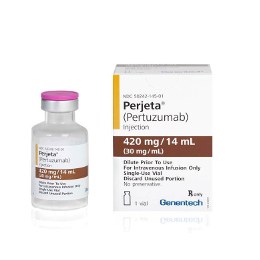Perjeta (Pertuzumab) vs Keytruda (pembrolizumab)
Perjeta (Pertuzumab) vs Keytruda (pembrolizumab)
Perjeta (pertuzumab) and Keytruda (pembrolizumab) are both targeted therapies used in cancer treatment, but they work in different ways and are used for different types of cancer. Perjeta is a HER2/neu receptor antagonist used primarily for HER2-positive breast cancer, often in combination with other drugs like trastuzumab and chemotherapy. Keytruda, on the other hand, is an immune checkpoint inhibitor that targets the PD-1 pathway and is used for a variety of cancers, including melanoma, non-small cell lung cancer, and head and neck cancers, among others; its use depends on the presence of specific biomarkers rather than the cancer's location or histology. Choosing between Perjeta and Keytruda would depend on the specific type of cancer a patient has, the molecular characteristics of their tumor, and the overall treatment plan determined by their healthcare provider.
Difference between Perjeta and Keytruda
| Metric | Perjeta (Pertuzumab) | Keytruda (pembrolizumab) |
|---|---|---|
| Generic name | Pertuzumab | Pembrolizumab |
| Indications | HER2-positive breast cancer | Various cancers including melanoma, lung cancer, head and neck cancer, Hodgkin lymphoma, and stomach cancer |
| Mechanism of action | HER2/neu receptor antagonist | PD-1 blocking antibody |
| Brand names | Perjeta | Keytruda |
| Administrative route | Intravenous | Intravenous |
| Side effects | Diarrhea, hair loss, nausea, fatigue, rash | Fatigue, cough, nausea, itching, skin rash, decreased appetite, constipation, joint pain, diarrhea |
| Contraindications | Hypersensitivity to pertuzumab or excipients | Severe hypersensitivity to pembrolizumab or its excipients |
| Drug class | Monoclonal antibody | Monoclonal antibody |
| Manufacturer | Genentech (Roche) | Merck & Co. |
Efficacy
Perjeta (Pertuzumab) Efficacy in Breast Cancer Treatment
Perjeta (pertuzumab) is a monoclonal antibody that targets the HER2 receptor, a protein found in high amounts on the surface of some cancer cells in HER2-positive breast cancer. When used in combination with trastuzumab and chemotherapy, pertuzumab has been shown to be effective in treating this type of breast cancer. Clinical trials have demonstrated that the addition of pertuzumab to the standard regimen can significantly improve progression-free survival and overall survival in patients with HER2-positive metastatic breast cancer. Furthermore, pertuzumab is also approved for use in the neoadjuvant setting (prior to surgery), where it has been shown to increase the rate of complete tumor eradication compared to trastuzumab and chemotherapy alone.
Keytruda (Pembrolizumab) Efficacy in Breast Cancer Treatment
Keytruda (pembrolizumab) is an immune checkpoint inhibitor that works by blocking the PD-1 receptor on T cells, enhancing the body's immune response against cancer cells. Pembrolizumab has been studied in the treatment of triple-negative breast cancer (TNBC), a type of breast cancer that does not express estrogen receptors, progesterone receptors, or excessive HER2 protein. This form of breast cancer is particularly aggressive and has fewer treatment options. Clinical trials have shown that pembrolizumab, in combination with chemotherapy, improves progression-free survival in patients with advanced TNBC, particularly in those whose tumors express the PD-L1 protein.
It is important to note that the efficacy of both Perjeta and Keytruda can vary based on individual patient factors, including the specific characteristics of the breast cancer, prior treatments, and overall health. As such, treatment decisions should be made on a case-by-case basis, in consultation with a healthcare provider who can evaluate the potential benefits and risks for each patient.
Both Perjeta and Keytruda represent significant advances in the treatment of breast cancer, offering hope for improved outcomes in certain patient populations. As research continues, these therapies may be further refined and potentially combined with other treatments to enhance their efficacy and provide more personalized care for patients with breast cancer.
Regulatory Agency Approvals
Perjeta
-
European Medical Agency (EMA), European Union

-
Food and Drug Administration (FDA), USA

-
Health Canada

-
Therapeutic Goods Administration (TGA), Australia

-
Medsafe (NZ)

Keytruda
-
European Medical Agency (EMA), European Union

-
Food and Drug Administration (FDA), USA

-
Health Canada

-
Therapeutic Goods Administration (TGA), Australia

-
Medsafe (NZ)

Access Perjeta or Keytruda today
If Perjeta or Keytruda are not approved or available in your country (e.g. due to supply issues), you can access them via Everyone.org.
How it works

Make an enquiry
Choose the medicine you want to buy, answer a couple of questions, and upload your prescription to speed things up. We’ll get back to you within 24 hours.


Make an enquiry
Choose the medicine you want to buy, answer a couple of questions, and upload your prescription to speed things up. We’ll get back to you within 24 hours.


Breeze through the paperwork
We'll guide you through the required documents for importing unapproved medicine, ensuring you have all the necessary information.


Get a personalized quote
We’ll prepare a quote for you, including medicine costs and any shipping, administrative, or import fees that may apply.


Receive your medicine
Accept the quote and we’ll handle the rest - sourcing and safely delivering your medicine.

Some text on this page has been automatically generated. Speak to your physician before you start a new treatment or medication.
Let's talk
If you have any questions, call us or send us a message through WhatsApp or email:
Contact us




